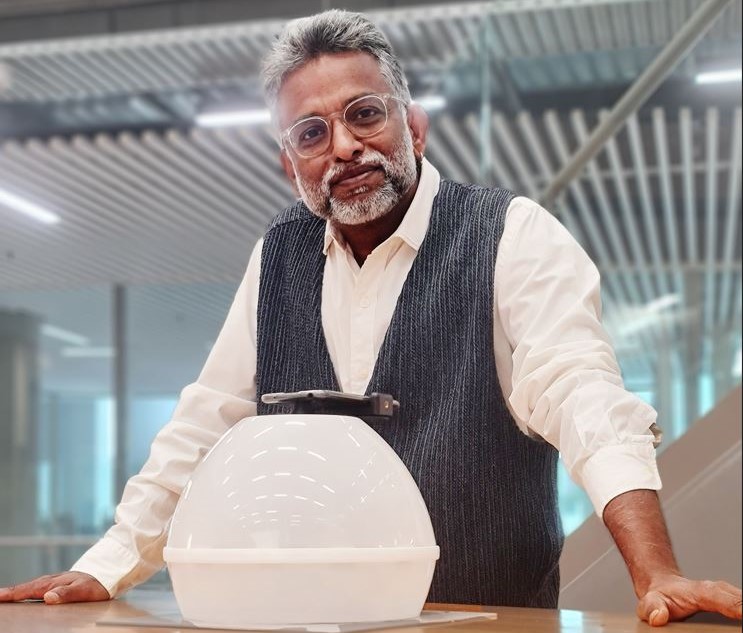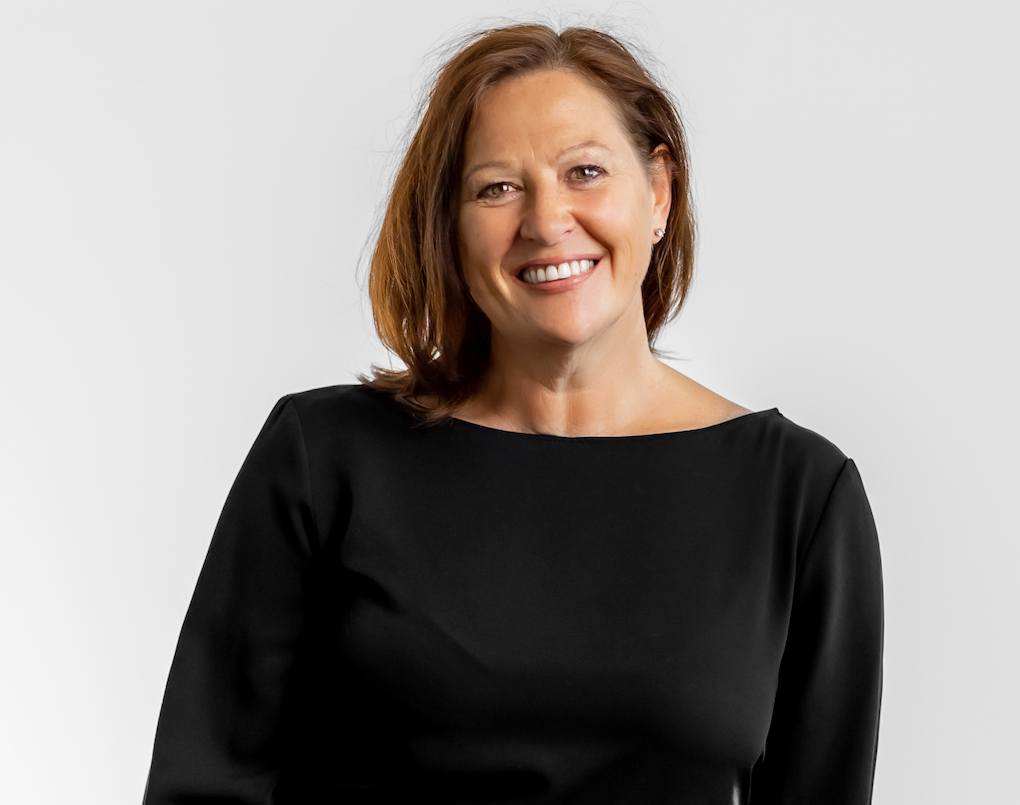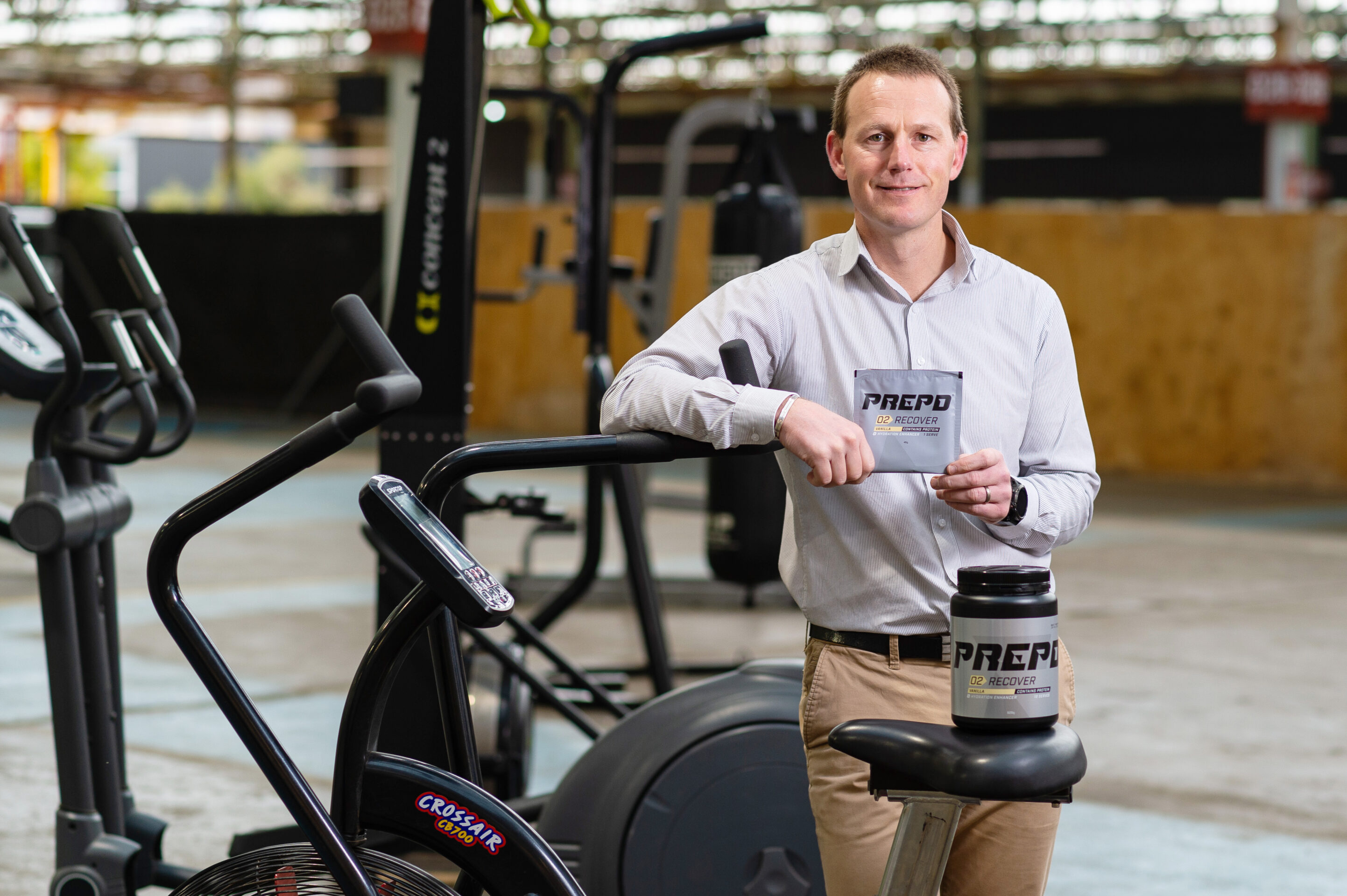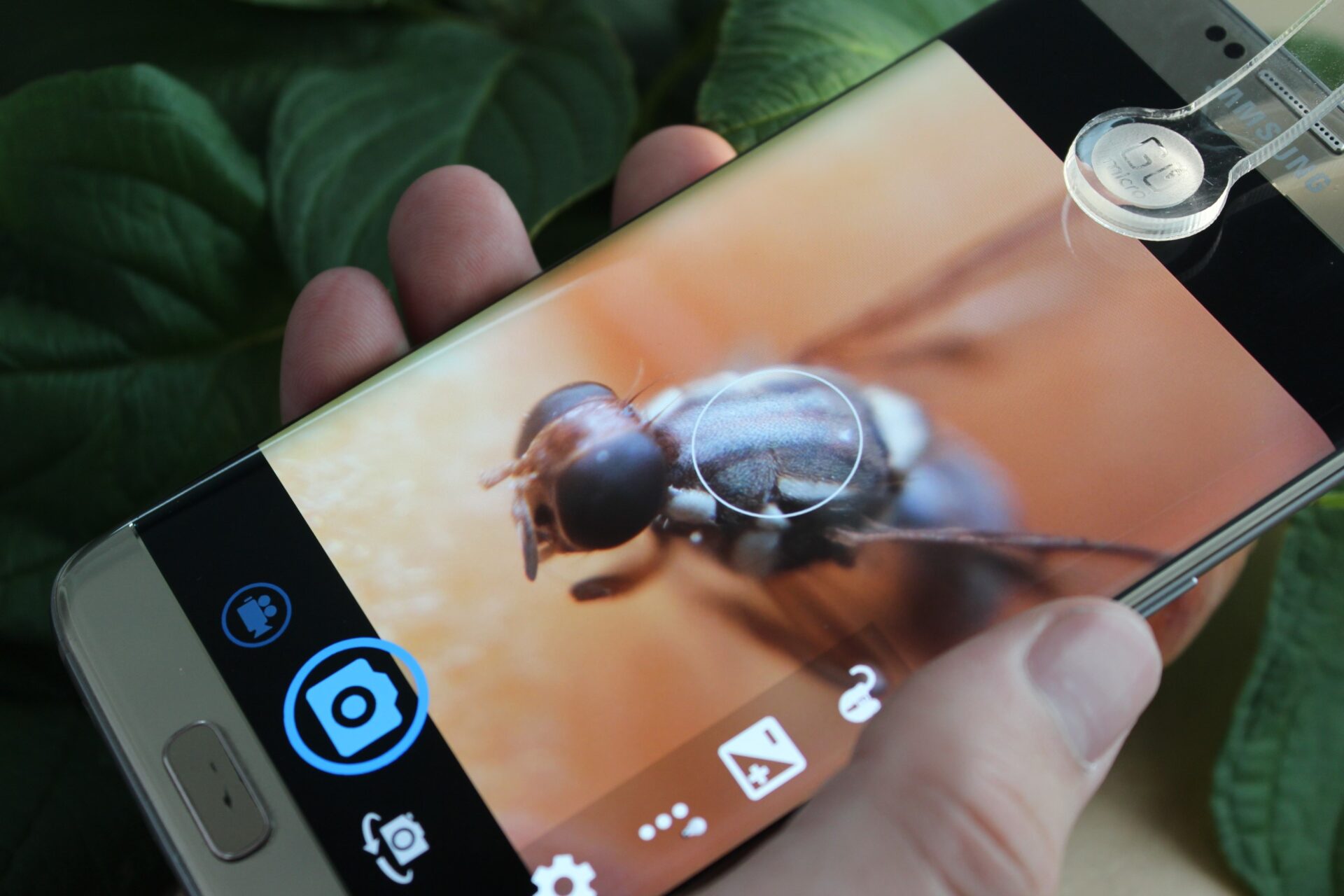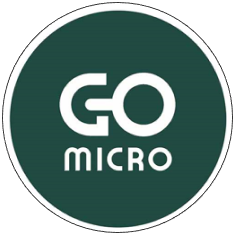From AI-aided grain assessment to mouthguard innovation, Tonsley start-ups run hot
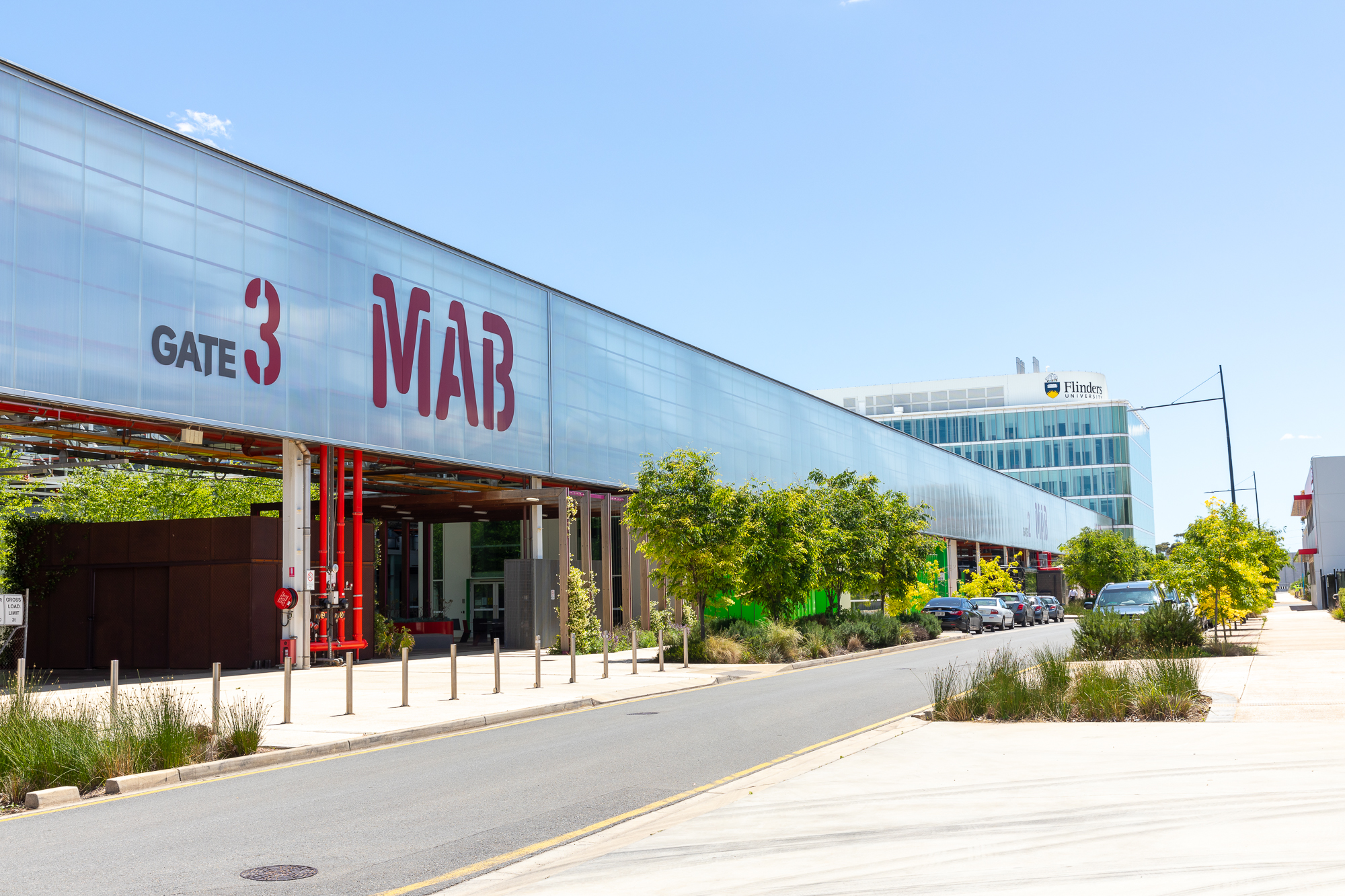
Since its inception, Tonsley Innovation District has been a magnet for start-ups, drawn to the precinct by the mix of education institutions and industry, the support systems, and its collaborative atmosphere.
In the first 10 years of Tonsley, there have been a host. Here’s a story about just three of them.
AI-enhanced grain analysis
Sivam Krish is the epitome of an ‘overnight’ success story that has been years in the making.
His idea for a lightweight, smart phone-based microscope was born while he was teaching at Adelaide’s Australian Maths and Science School when he was challenged to create a STEM program where students could self-learn.
“I created a very different space – in fact it was literally a basement with a dirt floor, a bunch of equipment and an atmosphere of support where students could explore their creativity,” he said.
“What became clear was that the kids were really engaged by the ability to magnify their world, but they seemed much more interested in doing it through their smart phones than with traditional microscopes.
“That led to the idea of creating a smart phone-based microscope.”
With qualifications from both Cambridge and the Massachusetts Institute of Technology, the engineering challenge was something Sivam was ideally suited to. But he needed a manufacturing solution.
“I found the New Venture Institute at Flinders University at Tonsley, and it immediately felt like the right creative, friendly and supportive place for me,” he said.
“I had access to laser cutting and 3D-printing at Tonsley, which was fantastic because we could rapidly build, test and iterate on the fly. We were able to produce 4000 phone-based microscopes in this way. While the rest of the world was still talking about direct digital manufacturing, we were already doing it at Tonsley.”
Twinned with an app using artificial intelligence that would read the images taken through the phone’s microscope, GoMicro was born. But there were plenty of false starts, with numerous potential partners showing interest in the technology only for things to fall short of commercialisation. Then, the South Australian Research and Development Institute ordered 200 of the microscopes to aid in the inspection of insects, and Sivam recognised the potential for agriculture.
“Quality control in food production is hugely inefficient, with up to 30% of food wasted because of the human involvement in quality control and the differences between inspection standards,” he said.
“When you have repeatable, technology-based precision, you can dramatically increase speed and accuracy and that leads to far less waste.”
With the aid of the lightweight mounted microscope, the GoMicro app uses artificial intelligence to assess grain quality ten times faster than manual assessors and at one-tenth the cost of current assessment.
The technology is already being used by companies in Australia, Indonesia and India and, in a further sign of how seriously agriculture is looking at AI, the Australian Government’s Grain Industry Research Association has recently called for proposals to accelerate the development of technology for the testing of wheat at receival sites – where it says current testing methods are “manual, slow, and largely subjective”.
GoMicro has also managed to crack the historically difficult challenge of checking the provenance of tuna destined for export – a key aspect of quality control in this multi-billion dollar global market – with GoMicro’s AI now able to pinpoint the origin of the fish by analysing its eyeball.
The international success of GoMicro means the company is rapidly outgrowing its Tonsley base. Whatever happens next, Sivam will always have a soft spot for where it all started.
"We were one of the first tenants [within Flinders’ New Venture Institute] at Tonsley back in 2017 and it has been an incredible journey, he said. Tonsley environment is fantastic, the New Venture Institute is amazing – I have loved building my company here. "
GoMicro Founder Sivam Krish
The polymer that’s unlocking a mouthguard revolution
Amanda Trenerry was at a funeral in 2017 when she had a conversation that would change her future – and propel her toward the Tonsley Innovation District.
“I’d been working on an idea for a revolutionary product but had no idea how to manufacture it,” she said.
“I was desperately searching as far afield as Germany for assistance when a friend at this funeral introduced me to a professor who told me about the Medical Device Partnering Program at Flinders University at Tonsley.
“I had no idea. It was incredible to me that there were people ready to help me and they were only 20 minutes from my house in Adelaide.”
The revolutionary idea was for a new type of mouthguard. As an experienced orthodontic hygienist, Amanda had become frustrated that there was no better alternative to the bulky, ill-fitting, over-the-counter versions or, at the other end of the scale, the higher cost dental options that require a dental appointment and can’t be remoulded to adapt to an individual’s changing mouth profile.
The springboard she needed came in the form of the Medical Device Partnering Program, which provides innovators with a mechanism to develop proof of concept, prototyping, clinical evaluation and commercialisation planning.
“Historically manufacturers have used ethyl vinyl acetate (EVA) which is mouldable but lacks strength, so I started looking globally and found a very different thermoplastic material that showed promise in both,” she said.
“We created a prototype that interlocked both materials together and the result was a strong and durable over-the-counter mouthguard that was customisable, comfortable, protective and re-mouldable. It’s really a no-compromise mouthguard that meets everyone’s criteria – athletes, parents and clinicians.”
The Medical Device Partnering Program also helped connect Amanda with a local manufacturer and NeoMorph mouthguards have now gained a foothold in the dental and orthodontic market and are being worn by athletes including numerous high profile AFLW and hockey players. Amanda is now in discussions with sporting retailers and pharmacy chains as the next step in her growth strategy.
“It’s been a fantastic journey so far and, if it wasn’t for the Medical Device Partnering Program, I’m not sure I could have navigated the pathway to do it myself,” she said.
“It’s incredible that this program was the first of its kind in Australia and it’s right here at Tonsley. It has given me exactly the expertise and support I needed.”
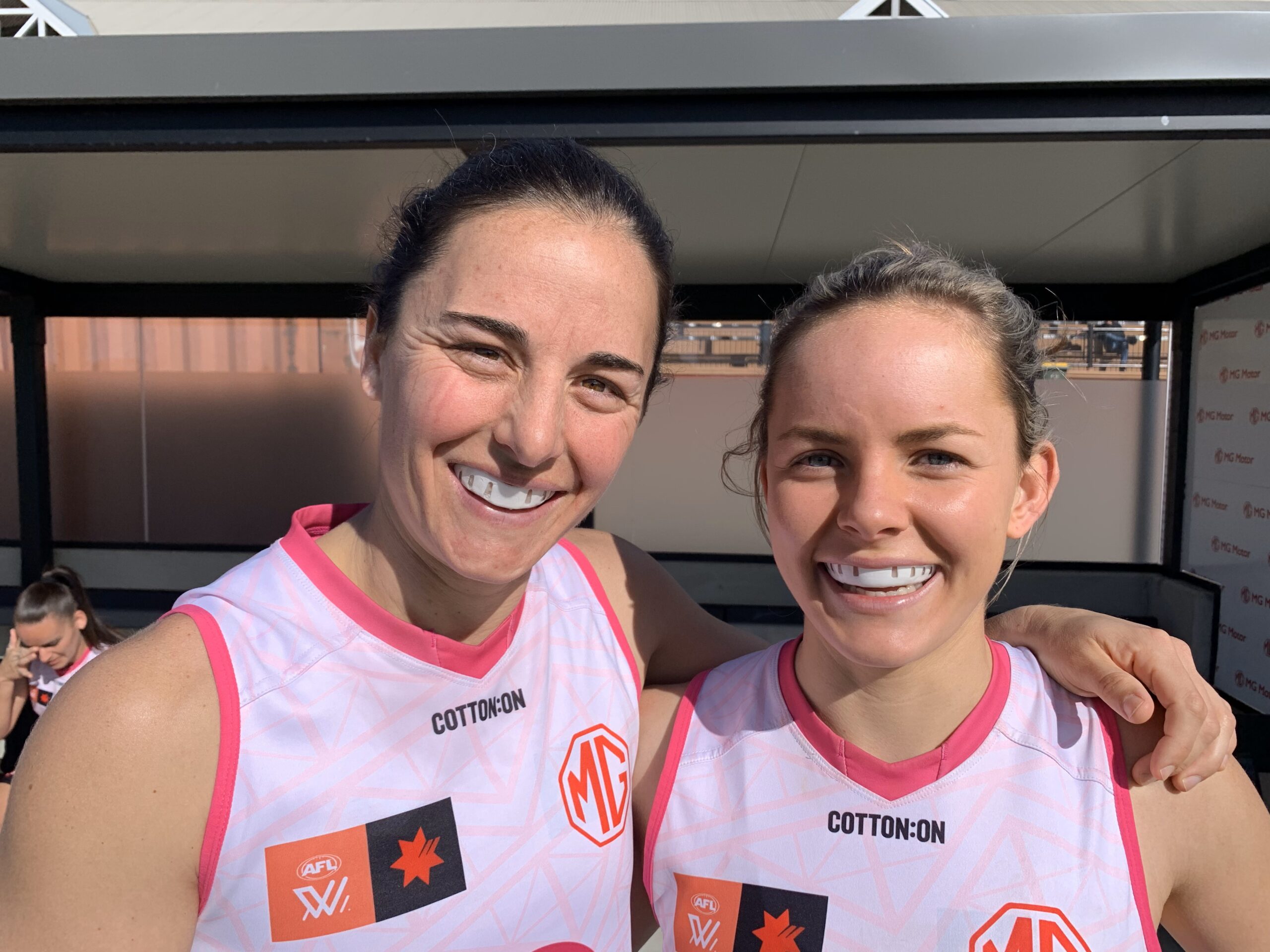
AFLW Players Ange Foley and Sachi Syme
Hydration innovation
PREPD Hydration was born at Flinders University’s New Venture Institute at Tonsley Innovation District out of research into ways to combat potentially fatal dehydration caused by diseases like cholera and rotavirus in developing countries.
Their efforts focused on enhancing absorption in the body by focusing on the largely unused potential of the large intestine to absorb up to five litres of fluid per day.
The PREPD team was able to develop a patented sustained fibre that enhanced hydration and improved health outcomes by 39% compared with the World Health Organisations’ recommended standards.
The most obvious extension beyond its original intent was its potential benefits for athletes, and this was reinforced through a clinical trial with the Adelaide Football Club that found that PREPD enhanced rehydration by 29% in recovery when compared with leading sports drinks.
PREPD is now used by athletes, triathletes and iron man competitors around the world – but, for this Tonsley start up, this is just the beginning.
“Hydration is a really important piece of a healthy and safe workplace,” CEO Andrew Perry said.
“To be dehydrated by just three percent slows our brain cognitive function to the equivalent of blowing 0.08, which obviously has huge ramifications in many industries.
“For example, we are starting to work with big mining companies who are seeing the benefits of hydration for the wellbeing and safety of their employees so they can perform their duties on site and get home safely by introducing a new product range called SAFETY by PREPD.”
This saw PREPD recognised by Core Innovation as one of Australia’s Hot 30 technologists driving innovation across Australia’s most important industries including mining and defence.
Educators have also seen the potential of the science behind PREPD, with trials now underway to provide students with a new product, called Advantage+ by PREPD that combines the sustained fibre with vitamin B12 to increase focus and mental cognition, providing a better option than sugary alternatives.
Off the back of the success of these trials, PREPD has plans for large scale commercialisation from its Tonsley headquarters.
"We have been at Tonsley since the foundation of the company in 2017 and we feel it is a great environment; there is a good ecosystem here and there is a lot of support for us,” Andrew said. “As a startup, you are running very lean in everything you’re doing and probably most people that work in one wear five or six different hats. “An innovation precinct such as Tonsley certainly helped us in terms of bringing in expertise and giving us the vital support that we needed as a startup. “I think it’s an absolute gem."
PREPD Hydration CEO Andrew Perry
Together at Tonsley
Stay up to date with the latest news, developments events and activities at Tonsley Innovation District
